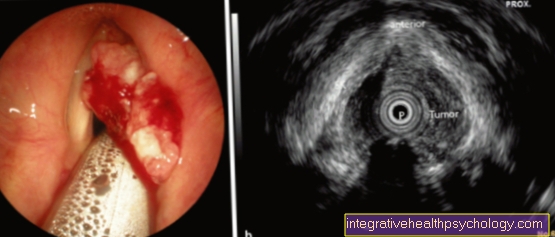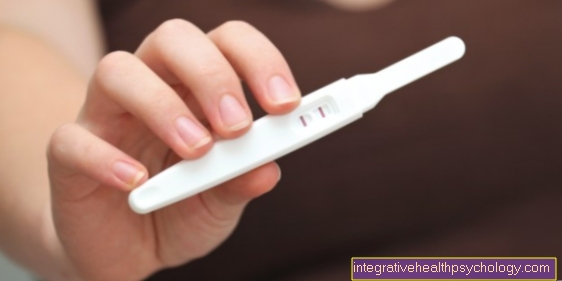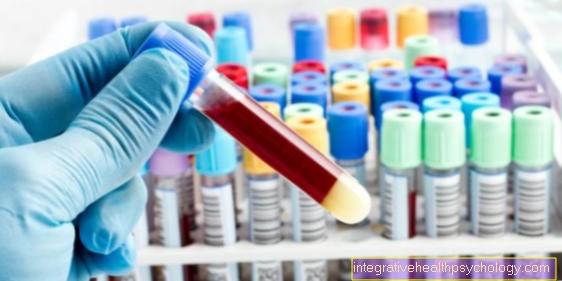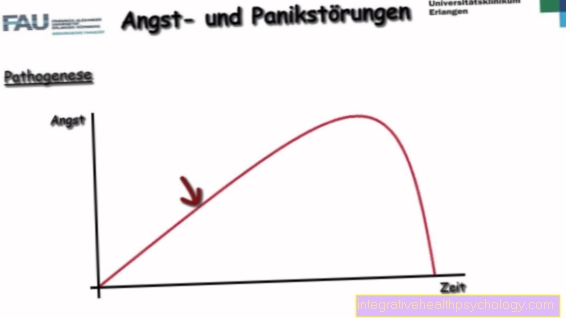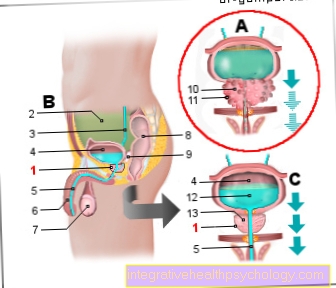Troponin test
definition
The troponin test measures the concentration of troponin in the blood. Troponin is a protein complex that, in conjunction with other components in muscle cells, enables the muscle to contract. Both the skeletal muscles (arbitrarily controllable muscles) and the heart muscle contain troponin. The troponin test is intended to measure cardiac troponin (from the heart). A distinction is again made between the two sub-forms "Troponin I" and "Troponin T". The measurement of "Troponin T hs" gives a highly sensitive result - a lot of sick people are recognized as such. When heart muscle cells are damaged, as can be the case with various diseases, the troponin levels in the blood rise. As a rule, the higher the increase, the greater the damage to the heart muscle.

When do I need a troponin test?
The indication for a troponin test are signs of a disease of the heart or lungs. For example, if a doctor or emergency medical personnel suspects a heart attack (myocardial infarction) or a pulmonary embolism, the troponin test is usually also carried out. If there are abnormalities in the ECG (electrocardiogram), a troponin test can also be requested to support the diagnosis. But even if the ECG - despite the existing symptoms - turns out to be normal, the troponin value can be groundbreaking. Overall, troponin is a marker for any stress or damage to the heart muscle and should therefore always be recorded if a heart disease is suspected, whether acute or chronic.
Find out more about: Heart failure and Signs of a heart attack
Carrying out the test
There are several ways that the test can be done. The systems only differ in their handling and accuracy. The rapid tests in particular are very easy to carry out. Patient blood must be spotted on the test and then the result read. If exact values are to be recorded, this is usually done in an appropriate laboratory. Two antibodies are used in the test. While one binds to the troponin in whole blood and intercepts it, the other generates the readable signal through its binding to the resulting complex.
Evaluation of the test
The evaluation should always be carried out by medical staff and ideally under the supervision of a doctor. Only then can an accurate follow-up care and the correct interpretation of the results be guaranteed. It is also important during the evaluation that the troponin values after a heart attack - the main indication for the test - do not rise until 3-4 hours after the event. Intervention in the form of a cardiac catheter should therefore not wait until the results are received. It can take between 12 hours and 4 days for the troponin level to reach its temporary maximum after the infarction. The troponin level is not influenced by the time of day, physical activity or special eating habits.
Measurement of troponin I / T:
- normal value: <4 µg / L
- suspicious value *: 0.4 - 2.3 µg / L
- Suspected heart attack:> 2.3 µg / L
Measurement of troponin T hs:
- normal value: <0.014 µg / L
- suspicious value *: 0.014 - 0.05 µg / L
- Suspected heart attack:> 0.05 µg / L
* possibly heart muscle disease or incipient increase after infarction
Alternatively, you might be interested in this article: Blood test
What does a troponin increase mean?
The most common indication for a troponin test is a suspected heart attack. It was found that the level of troponin levels are associated with the degree of cardiac muscle damage. A particularly marked increase in troponin levels is therefore also very unfavorable from a prognostic point of view (considering the course). In addition to acute myocardial infarction, there may also be other cardiac causes (affecting the heart): inflammation of the heart muscle (myocarditis), severe heart failure, stress on the right heart in the case of pulmonary embolism (also: pulmonary infarction), existing cardiac arrhythmias, cardiac trauma after injury or certain cardiomyopathies. Elevated troponins of non-cardiac origin can be caused by renal insufficiency, a stroke or particularly serious illnesses (such as blood poisoning / sepsis). The increase in troponin is almost always associated with a moderate to severe clinical picture, which is why you should always go into medical care in this case.
You may also be interested in the following articles:
- Consequences of a heart attack
- Diagnosis of myocardial infarction
- Heart attack risk
Myocarditis
In inflammation of the heart muscle (myocarditis), the troponin level is increased along with some other cardiac enzymes. Constant values between 0.4 µg / L and 2.3 µg / L indicate an inflammatory process rather than a heart attack. In addition to the increase in enzymes, EKG changes and signs of inflammation on the imaging can also be indicative. Only an increased troponin value does not prove the presence of myocarditis. Many patients in whom the suspicion is confirmed report a previous infection. This course is classic for the development of heart muscle inflammation and should therefore be mentioned when visiting a doctor.
Read more about the topic here: Myocarditis
Renal failure
Renal insufficiency is a non-cardiac cause of elevated troponin levels. Troponin is excreted through the kidneys in a healthy body. When these can no longer work normally, the troponin builds up in the blood. This slow increase can be measured in almost all patients with existing renal insufficiency. The higher the values, the more severe the kidney damage. An actual cardiac disease can also be hidden in the constantly increased values. More than 50% of patients with kidney disease die from such a disease. This is why the troponin level is also an important marker in the monitoring of kidney failure and dialysis patients.
Find out more about: Kidney disease
Can the test be false positive?
When examining the results of the troponin test, care should always be taken to consider all causes for an increase. If there are no symptoms and no abnormalities in the ECG, the likelihood of a heart attack is rather low, even with an increase in troponin levels. Now the other diagnoses should be checked, which also fall into the group of troponin-increasing diseases. An isolated increase in troponin T (if measured) can also be attributed to a skeletal muscle disease, whereas troponin I is only increased in the case of an actual heart disease or pressure disorder affecting the heart (e.g. high blood pressure). Highly sensitive measuring methods can reduce the number of false positive results with regard to heart attack diagnosis. While a slightly elevated troponin does not always have an acute illness value, but can also be traced back to chronic illnesses, a suddenly sharply elevated troponin value always requires clarification and must be treated as an emergency until proven otherwise.
Find out more about: Cardiac failure EKG
What do I do with a positive test result?
A positive test result should usually be received in the presence of a doctor. Continuous medical care must be guaranteed both in the case of a rapid test by the family doctor and in the case of testing after admission to the hospital. After a positive test result, if this has not yet happened, further diagnostics must be carried out and the cause of the increase found out as soon as possible. If the test is carried out and evaluated alone at home or not in the presence of medical staff, a hospital should be visited immediately if the result is positive.
Learn more about: Blood test
How long will it take to get the test result?
If a rapid troponin test is used, the result can be read approximately 10 minutes after the blood is instilled. This does not include the duration of the blood draw. When whole blood is sent to a laboratory to determine troponin levels, the time between collection and evaluation will of course be longer. There is a possibility of performing a rapid test if an acute clinical picture is suspected and, in addition, sending a sample to a qualified laboratory.
Can I do such a test myself?
Carrying out a troponin test on your own does not make sense. The first problem is drawing blood, which should be difficult for most people without medical personnel. Even if the blood draw works and the test can be filled, the question arises as to what consequences a positive test result has for the patient. The next step is to put himself under medical care anyway, which means that all of the previous steps pose an unnecessary risk. If you have symptoms, you should always report to a hospital, regardless of whether a diagnosis could not be made at the last visit.
Learn more about: cardiology
How much does a troponin test cost?
If there is a reasonable indication for carrying out the troponin test, the costs will be covered by the statutory health insurance companies. The request can only be made by a doctor if the costs are covered. Various quick tests are also offered on the Internet, which cost between 3 and 6 euros per test. Not included, however, are needles and collection tubes, which are also required for taking blood. More complex systems for determining the troponin value are significantly more expensive and are not made for private use.






